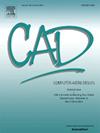Face2Wear: An automatic and user-friendly facewear personalization framework with 3D symmetry-aware face registration using RGB-D selfies
IF 3.1
3区 计算机科学
Q2 COMPUTER SCIENCE, SOFTWARE ENGINEERING
引用次数: 0
Abstract
The realm of personalized human wearable has undergone significant evolution. However, existing methodologies often lack in addressing crucial factors essential for comprehensive facewear customization, including automation, accuracy, convenience, and comfort. To bridge this gap, we propose an automated and user-friendly approach for ergonomic facewear personalized based on 3D face modeling and registration. Our approach involves the development of a user-friendly 3D face scanning technique utilizing RGB-D selfies captured by smartphone depth cameras, simplifying the process of personal data collection. Subsequently, we present a precise 3D symmetry-aware face registration method integrated with automatic facial landmark detection to produce parameterized 3D facial meshes featuring accurate symmetry panels. Additionally, we introduce a comfort-centric eyeglasses customization process to showcase its practical applications. Qualitative and quantitative comparisons with state-of-the-art techniques highlight the efficacy of our symmetry-aware registration method. Experimental findings also showcase the versatility of our approach across various scanning data. Evaluation results underscore the practical utility of our method in creating personalized eyeglasses with significantly enhanced comfort levels. Moreover, our method can be extended to other symmetric facewear designs, such as sunglasses, swimming goggles, and respirators.
Face2Wear:一个自动和用户友好的面部个性化框架,使用RGB-D自拍照进行3D对称感知面部注册
个性化的人体可穿戴领域经历了重大的发展。然而,现有的方法往往缺乏解决全面的面部定制所必需的关键因素,包括自动化、准确性、便利性和舒适性。为了弥补这一差距,我们提出了一种基于3D人脸建模和配准的自动化和用户友好的人体工程学面部个性化方法。我们的方法包括开发一种用户友好的3D面部扫描技术,利用智能手机深度相机拍摄的RGB-D自拍,简化个人数据收集过程。随后,我们提出了一种精确的三维对称感知人脸配准方法,结合人脸自动地标检测,生成具有精确对称面板的参数化三维人脸网格。此外,我们还介绍了以舒适为中心的眼镜定制流程,以展示其实际应用。定性和定量比较与最先进的技术突出了我们的对称意识注册方法的有效性。实验结果也展示了我们的方法在各种扫描数据中的多功能性。评估结果强调了我们的方法在创造个性化眼镜方面的实用性,显著提高了舒适度。此外,我们的方法可以扩展到其他对称的面部设计,如太阳镜,游泳镜和呼吸器。
本文章由计算机程序翻译,如有差异,请以英文原文为准。
求助全文
约1分钟内获得全文
求助全文
来源期刊

Computer-Aided Design
工程技术-计算机:软件工程
CiteScore
5.50
自引率
4.70%
发文量
117
审稿时长
4.2 months
期刊介绍:
Computer-Aided Design is a leading international journal that provides academia and industry with key papers on research and developments in the application of computers to design.
Computer-Aided Design invites papers reporting new research, as well as novel or particularly significant applications, within a wide range of topics, spanning all stages of design process from concept creation to manufacture and beyond.
 求助内容:
求助内容: 应助结果提醒方式:
应助结果提醒方式:


